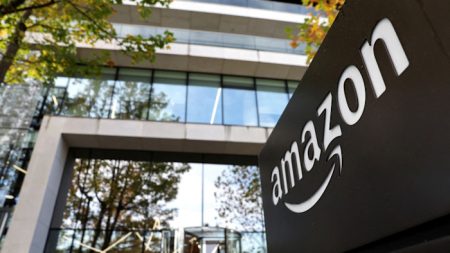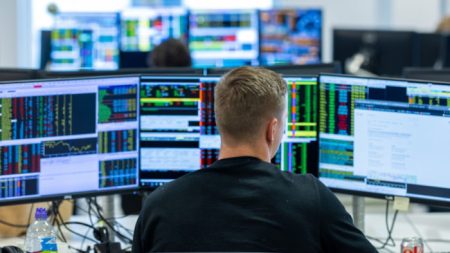Unlock the Editor’s Digest for free
Roula Khalaf, Editor of the FT, selects her favourite stories in this weekly newsletter.
A divide is widening in the US economy as the biggest banks and technology groups shrug off Donald Trump’s tariffs to post huge earnings gains while consumer-facing companies struggle with rising costs.
Blockbuster second-quarter results from the tech groups, including Apple, Meta and Microsoft, and lenders JPMorgan and Goldman Sachs that dominate the S&P 500, paint a picture of a booming economy, supporting the president’s assertion this week that America “is the hottest country anywhere in the world”.
Below the surface, however, large parts of corporate America are grappling with slowing profits and the extreme uncertainty generated by Trump’s aggressive trade war.
With almost two-thirds of S&P 500 companies having reported second-quarter results, earnings for consumer staples and materials companies are down 0.1 per cent and 5 per cent year on year, according to FactSet data.
In total, 52 per cent of the S&P 500 companies to have posted results have reported declining profit margins, according to Société Générale.
Andrew Lapthorne, the bank’s global head of quantitative research, said companies were reporting margin pressure even as their sales rose.
“That divergence suggests that their costs are going up but that companies aren’t yet passing this on [to consumers].”
The 10 biggest stocks on the S&P 500 account for one-third of overall profits across the index, with tech and financials reporting year-on-year quarterly earnings growth of 41 per cent and 12.8 per cent, respectively.
But a flurry of data released over the second half of this week suggest slowing US economic growth beyond Wall Street and Silicon Valley, even as Federal Reserve chair Jay Powell on Wednesday kept interest rates on hold between 4.25 per cent and 4.5 per cent in response to the economy’s apparent resilience to Trump’s tariff blitz.
The president’s argument that Powell has been “too slow” to lower rates was bolstered on Friday when the Bureau of Labor Statistics said the world’s biggest economy added just 106,000 jobs from May to July, down sharply from the 380,000 added in the previous three months.
A GDP report on Wednesday also showed the economy grew at a 1.1 per cent annualised rate in the first half of 2025, compared with 2.9 per cent in the second half of the previous year, according to Financial Times calculations.

Carmakers, airlines and companies manufacturing household durables such as refrigerators and washing machines were already under pressure, and have reported the largest downward revisions to net income for this year, according to Ryan Grabinski at Strategas Securities.
“This doesn’t come as that big of a surprise given their direct ties to tariffs,” he said.
Companies reporting negative earnings surprises were being punished by investors, said FactSet’s John Butters, falling by an average of 5.6 per cent over the four days around the announcement of their results. The five-year average decline for stocks reporting earnings misses is 2.4 per cent.
Trump on Friday lifted America’s effective tariff rate to its highest level in decades, slapping steep levies on Taiwan, Canada, Switzerland and India, among others.
Big Tech stocks have nevertheless blown past analysts’ earnings forecasts, with Microsoft last week announcing a 25 per cent jump in quarterly profits and Meta reporting a 36 per cent increase in net income.
For the largest tech companies, “it’s been another solid earnings season, with bulls focused on their growing artificial intelligence capex spending”, said David Stubbs, chief investment strategist at fund manager AlphaCore.
“Elsewhere, the influence of tariffs is starting to bite,” he added, pointing to Ford’s surprise quarterly loss due in part to an $800mn hit from Trump’s levies.
“The hope is that AI investment will keep the economy going. But you have to acknowledge that some of the tailwinds from greater migration and greater fiscal spending have run their course,” Stubbs said.
Read the full article here












